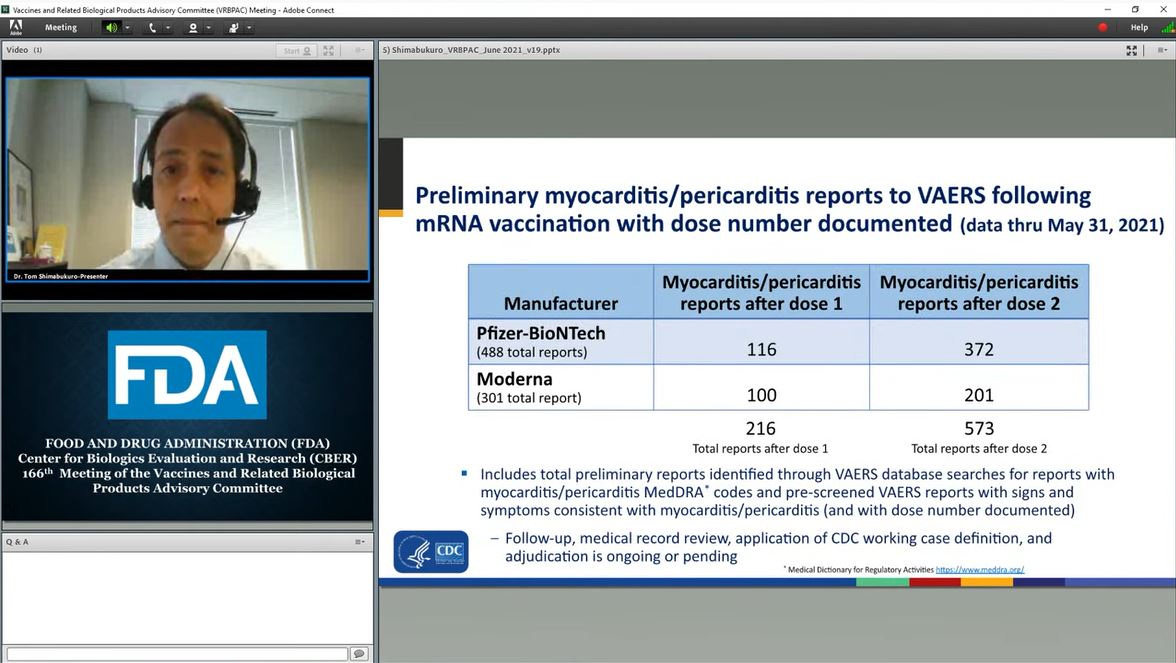Federal authorities have received over 800 reports of heart inflammation in people who received a COVID-19 vaccine, a health official said Thursday.
The reports of myocarditis or pericarditis were submitted to the Vaccine Adverse Event Reporting System, a passive reporting system run jointly by the Centers for Disease Control and Prevention (CDC) and the Food and Drug Administration, through May 31.
The bulk of the reports described heart inflammation appearing after the second of two doses of either the Pfizer of Moderna vaccines, both of which utilize messenger RNA technology.
Authorities stress that anybody can submit reports through the reporting system but authorities have already verified that 226 of the reports meet the CDC’s working case definition, Dr. Tom Shimabukuro, a deputy director at the agency, said during a presentation of the data. Followup and review are in progress for the rest.
Of the 285 case reports for which the disposition was known at the time of the review, 270 patients had been discharged and 15 were still hospitalized, officials said. Myocarditis typically requires hospital care. No deaths were reported.

The CDC announced last month that it was investigating reports of heart inflammation in teenagers and young adults who received a COVID-19 vaccine, though it took no definitive action besides saying it would continue reviewing case data.
An advisory committee to the agency, the Advisory Committee on Immunization Practices, said in a little-noticed update published dated May 24 and published on June 1 that data from VAERS showed that in the 30 days following the second dose of mRNA vaccinations, “there was a higher number of observed than expected myocarditis/pericarditis cases in 16–24-year-olds.”
Data from the Vaccine Safety Datalink, an active reporting system that relies on nine healthcare organizations in seven states, did not show higher than expected cases, it added.
“However, analyses suggest that these data need to be carefully followed as more persons in younger age groups are vaccinated,” the advisory committee’s vaccine safety workgroup said in its report.
Israel’s Health Ministry said that same day that it found 275 cases of heart inflammation among the more than 5 million people in the country who received a vaccine between December 2020 and May. An Israeli study found “a probable link” between receiving the second dose of the Pfizer jab “and the appearance of myocarditis among men aged 16 to 30,” the ministry said.
Shimabukuro said the U.S. passive surveillance data “are consistent with the surveillance data that emerged from Israel.”
The figures are also consistent with other case reports and data from the Department of Defense.
The vast majority of the U.S. reports deal with male patients. Approximately 300 preliminary reports indicated the patients suffered chest pain, with nearly as many having elevated cardiac enzymes.
A case report examining myocarditis in seven adolescents following vaccination with Pfizer’s jab, published in Pediatrics, the journal of the American Academy of Pediatrics, this month, said all seven developed the inflammation within 4 days of receiving the second dose, did not have evidence of COVID-19 infection, and did not meet the criteria for MIS-C, a rare disease.
The seven males, between the ages of 14 and 19, all required hospital care but each was eventually discharged.
Authors, who did not respond to requests for comment, said no link has been established between the vaccines and myocarditis and that the benefits of the vaccines outweigh the risks. But they also urged healthcare workers “to consider myocarditis in the evaluation of adolescents and young adults who develop chest pain after COVID-19 vaccination.”


